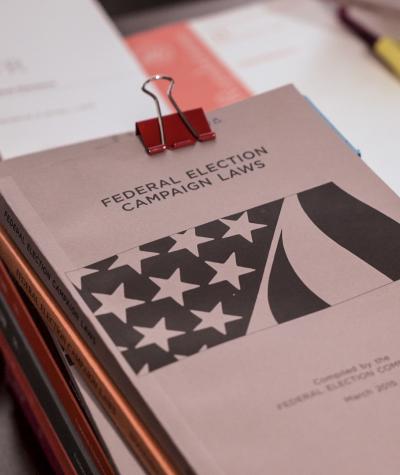Foreign nationals have long sought to influence our elections to advance their interests over those of the American people. Since its founding, our nation’s leaders have cautioned against “foreign Interference, Intrigue, and Influence” in our elections and in our government. That warning should ring with even greater force today.
During the 2016 election, Russian efforts to manipulate American voters and help elect their preferred candidates were on full display, which prompted formal inquiries and hearings by Congress and criminal prosecutions by the Department of Justice. And just days ago, the Associated Press quoted a Kremlin-connected businessman known as “Putin’s chef,” who confirmed in social media posts that Russian efforts to interfere in U.S. elections had occurred, are occurring, and will continue to occur.
Federal law explicitly prohibits foreign nationals from directly or indirectly making contributions or donations of money in connection with any federal, state, or local elections, as well as any expenditures, independent expenditures, or disbursements for electioneering communications. These decades-old provisions were designed to act as a bulwark against foreign influence in our elections.
After the clear and malicious attempts to interfere with the 2016 election, regulators and Congress alike acknowledged the importance of combatting foreign election influence. The Federal Election Commission (FEC), the regulatory agency charged with administering and enforcing federal campaign finance laws, suggested it would prioritize cases implicating the ban on foreign election spending.
Yet the FEC’s repeated failure to enforce the laws banning foreign money in our elections belies that commitment. The FEC recently deadlocked and closed a matter where a U.S. company, American Ethane Co., used money from Russian oligarchs to support federal candidates and PACs during the 2018 election cycle.
Back in 2019, in a rare instance of bipartisan agreement among Commissioners — three of whom have since left the agency — the FEC approved conducting a formal investigation into this matter.
That investigation established that American Ethane is a U.S. company and its chief executive is a U.S. citizen, but when it made its political contributions, the company was 88% owned by three Russian nationals.
Worse, as stated in the post-investigation report from the FEC’s nonpartisan Office of General Counsel, American Ethane “had no domestically generated income and made political contributions using funds obtained through loans [from] entities [that] are themselves foreign and owned by foreign nationals.”
Put simply, American Ethane made contributions exclusively using money from foreign nationals.
The Office of General Counsel thus recommended moving forward with enforcement action on the foreign election spending allegations. But the FEC’s current Republican Commissioners, none of whom were serving when the FEC voted to investigate this matter, disagreed, deadlocking the Commission into a 3-3 split vote, and their explanation is especially troubling.
The Republican Commissioners dismissed the uncontested facts set forth in the General Counsel’s report and instead characterized this foreign money as an “investment” in an American company rather than as foreign money used to influence our elections. Since an American company is legally entitled to engage in certain kinds of political spending, they reasoned, there was no violation of the foreign contribution ban.
This approach, which can be read to suggest that foreign money can be spent on elections if it is first “invested” in a U.S. business, is legally unsound and raises deeply troubling ramifications. These Commissioners have ignored the FEC’s own precedents and fundamentally misapplied federal campaign finance laws, increasing the risk of foreign election interference at a time when our elections are persistently threatened by foreign interests.
Federal law prohibits foreign nations from “directly or indirectly” injecting money into our elections. And prior FEC decisions make clear that U.S. companies that are majority-owned by or subsidiaries of foreign nationals can only make contributions with funds generated by their U.S. operations, and only if no foreign national participates in the decision to contribute.
The refusal of three Commissioners to follow the FEC’s own precedent now raises serious concerns about the agency’s commitment to protecting our elections from foreign interference. Foreign interference in our elections remains a threat. Opening new avenues for foreign money to influence our elections leaves our democracy dangerously vulnerable.

